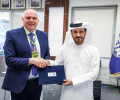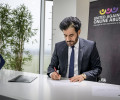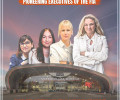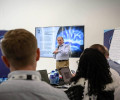President’s Speech for the General Assembly 2015
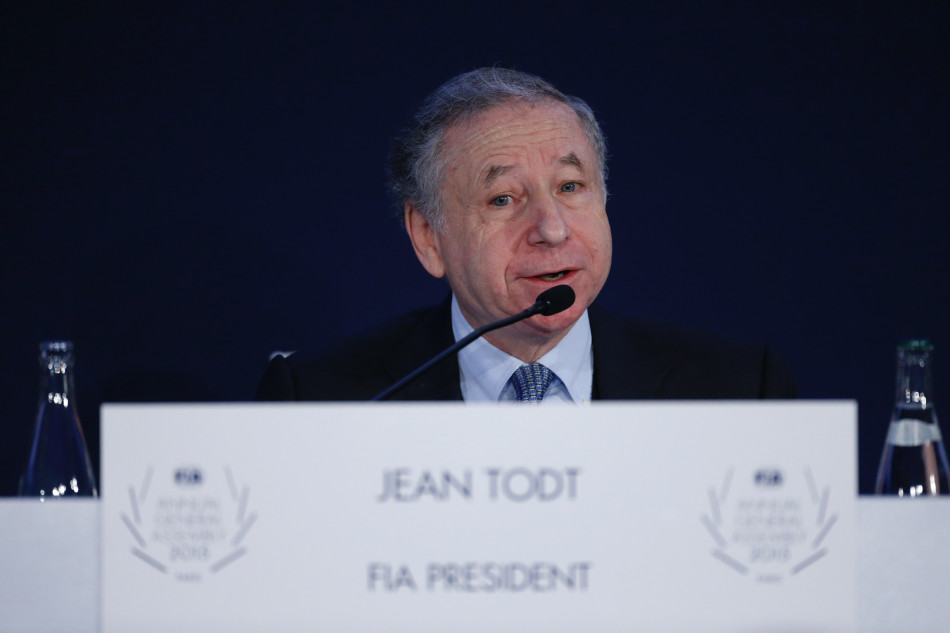
Dear Friends
Dear Colleagues
During this week of our General Assembly you have experienced a different Paris from what you are used to.
There is a high level of security wherever you go, and the people of this great city are still in shock from the terrible, dramatic events of three weeks ago.
What happened here was only the latest in a long list of appalling events that have taken place around the world in recent years.
The lives of people in countries across our planet have changed. We now find ourselves in times of unease and uncertainty.
The FIA is an example of international cooperation between peoples from all cultures, all religions and all races, which, in such difficult times, makes me proud of you and of our great organisation.
Let us now pause to remember all the victims of terrorism during 2015 and in the years before. Please, stand and join me in observing a minute’s silence.
Thank you.
Let’s now turn to our FIA world.
We are half way through our second term, and there is much to report in regard to the progress we have made and the challenges that lie before us.
Due to what has happened at FIFA and the IAAF, there will be increasing scrutiny on all global sporting federations.
And we should not fear this scrutiny. Because of the reforms we have undertaken over the past 6 years, on the contrary, we welcome it.
The FIA can meet its obligations to its members, to the athletes who compete under our motorsport governance, and to the public who strongly support our mobility clubs and our ASNs.
When you elected me as President one of my first acts was to establish an independent Statutes Review Commission.
Its task has been to review our Statutes and Governance so that the FIA operates in the most transparent, democratic and ethical way possible.
The Commission put forward proposals for wide-ranging changes, all of which were accepted and approved by you, members of our General Assembly.
The reforms the Commission has introduced are significant.
- They have re-structured the way we hold elections to ensure fairer and more democratic representation on our bodies and institutions,
- They have ensured that the decision making of our Federation is more transparent and responsive to the needs of its members,
- They have strengthened the Senate making it more representative, and with a greater role in overseeing our operations, and
- They have ensured we have a modern management structure that works well for us now and in the future.
As part of this reform process, I sponsored the creation of an independent Ethics Committee and the adoption of an FIA Code of Ethics that you all know well.
The Committee is able to investigate matters on its own initiative or matters that have been referred to it. It can propose amendments to the FIA Statutes or to the Code of Ethics.
It manages our Conflict of Interest Declarations and the global compliance of the Federation and its parties.
We have also taken a strong anti-doping stance by working with the World Anti-Doping Agency, WADA. We want strict regulations and testing procedures for those involved in motorsport.
A proposal was recently put to the FIA Senate that an independent external firm be contracted to review all our internal procedures.
This has been approved and Deloitte has been chosen to conduct this review from the beginning of 2016.
We have put in place the necessary checks and balances to ensure that our organisation is transparent, democratic and ethical. This process of critical self-examination and improvement was long overdue.
This year’s FIA Financial Report will be presented in more detail by Senate President, Nick Craw, and Chief Administrative Officer, Damien Clermont.
Before they do that, I would like to highlight the significant strengthening of the FIA’s financial situation achieved by my team over the past few years.
When you first elected me in 2009, the FIA’s total annual revenues amounted to 45-point-8-million-euro.
The accounts you will be asked to approve today show annual revenues in excess of 100-million-euro, the first time in the FIA’s history this has been achieved.
Our financial reserves, which are kept to protect the FIA, were 30-million-euro in 2009. Today we hold 140-million-euro in reserve.
This success does not just happen. It results from careful planning and a great deal of effort by our elected officials and by our loyal and hard-working staff.
This growth in our financial revenues is being invested in developing our action plans for Motor Sport and Mobility either directly, or through our member Clubs and ASNs.
This year alone we have provided over Five-and-a-Half-million-euro directly to our clubs and ASNs. This is a record, and with continued success, this figure should grow.
As those of you representing Mobility Clubs know, there has been significant progress across a range of activities.
Working closely with their World Council, Deputy President, Brian Gibbons and Secretary General, Andrew McKellar, have refocused the Mobility effort around a number of key areas that include -
- Better servicing the needs of clubs in a challenging and changing business environment,
- Strengthening the FIA’s position as a Global Policy Leader in the critical areas of road safety and sustainability, and
- Supporting club development to strengthen individual clubs both in their home countries and as partners in our global family.
A new structure supports these goals by placing emphasis on Policy and Advocacy, Membership Services, Club Development and Road Safety.
We have to recognize the substantial changes that are taking place across our network of member clubs:
- The transition from being mainly focused on the automobile, to a broader membership model;
- The increasing importance of international collaboration; and
- The opportunity to work more effectively by connecting members with services that they value.
Each of our member clubs face different challenges in their own unique operating environment, but the FIA provides a platform where solutions can be tailored to the needs of the individual member.
Working in close collaboration with the Mobility Regions, it is the responsibility of the FIA Mobility team in Paris to ensure that the additional resources and finances that are now available, best support this outcome.
Two weeks ago, together with over 70 club delegates from 47 countries, I attended the United Nations 2nd Global High Level Conference on Road Safety in Brasília.
The Conference re-enforced the need for the FIA and its clubs and ASNs to take a strong lead if we are to achieve the goals of the Decade of Action for Road Safety.
Together with the United Nations Secretary General, Ban Ki-Moon, we launched our new High Level Panel for Road Safety on November 11.
The Panel consists of some of the most senior individuals in the world of mobility, transport and road safety and will work under the FIA’s leadership.
The task of the panel is to engage both the public and the private sectors to raise funding and political awareness in response to the global road safety crisis.
Importantly the panel will support the new Sustainable Development Goals, which were approved at the latest UN General Assembly and include a commitment by governments to cut road fatalities in half by 2020.
As you know one of my priorities is to contribute to improve road safety outcomes.
My appointment this year as the U.N. Secretary General’s Special Envoy for Road Safety is a great responsibility and for me personally, quite humbling.
I accepted the role conscious that it is a reflection of the importance and influence of the FIA and its member clubs.
With our tens of millions of motoring members worldwide, we are in a strong position to achieve the significant reductions being sought in road trauma.
We will all agree that we have made too little progress in the first half of the Decade of Action and we need to do much more to meet the goals.
Let’s now speak about motor sport.
Our Deputy President, Graham Stoker, and Secretary General, Jean-Louis Valentin, have been focusing on three main objectives.
The first is to ensure the future of our championships, which represent a vital asset for the FIA and all its members.
The second is to develop increased expertise in the areas of safety, development and technical support.
The third is to ensure environmental sustainability through the adoption of innovative technology, and particularly engine development.
Formula One remains the pinnacle of our sport and the main focus for the public and for motor sport fans.
With the support of FOM, the FIA is working to ensure the sustainability of the championship through cost reduction for the teams.
This is a difficult process but it is necessary to keep Formula One healthy.
Despite this challenge it is pleasing that next year we will see further growth in Formula One with 21 events and a new team, HAAS Grand Prix, from the United States.
Behind Formula One, we are strengthening and stabilising the entire single-seater pyramid which provides a natural progression for young drivers.
For so many leading drivers, the journey to Formula One began with Karting and this will continue as the first step in our pyramid.
The second is F4. There are now more than 10 national F4 championships in place and our third step, F3, has been consolidated at continental level.
2016 should bring with it the advent of F2, which will complete the pyramid by providing the final step to Formula One.
To ensure the future of our sport we need to provide pathways of this kind from the grassroots all the way up to high level competition.
The second season of Formula E is now underway and continues to grow in popularity.
This innovative championship takes place in the heart of many prestigious cities including London, Paris, Berlin, Buenos Aires, Moscow and Beijing. It is attracting a new public to our sport.
We are pleased to welcome 2 new strategic partners this year in Liberty and Discovery. Their involvement further enhances the financial viability of the series.
For the other circuit championships, WEC, WTCC in particular, we are enhancing the professionalism of the FIA officials, management, and our promoters at these events.
We will seize opportunities to develop and extend the “FIA” brand in the disciplines where it could be stronger, such as Touring Car and GT.
In rally, our objective remains to differentiate more clearly between the national, regional and international levels.
The WRC is thriving, with a number of new countries, including China, interested in organising events.
In 2016, we will have a calendar of 14 events, combining “iconic rallies” and new territories.
While this is pleasing we know we have to do more to improve safety.
There have been too many accidents and too many victims, including spectators, in rallies often organised without authorisation.
To address this crucial issue I have established a Task Force of experts, available at the request of ASNs. This includes flying medical teams available to FIA clubs around the world.
The disciplines of Historic Motor Sport, Off-Road and Hill Climb, are too often overlooked.
They are at the heart of motor sport for true enthusiasts world-wide, and their promotion and development are very much part of our agenda.
Our key objectives include extending the scope of the championships, encouraging ASNs to organise events of this kind and securing the courses and categories of cars entered.
It is important that our motoring heritage is not only preserved but that we continue to experience and enjoy the pleasure of historic motoring.
Our International Historic Commission and our Historic Motor Sport Commission actively fulfil this mission and their members are known for their energy and devotion.
I pay special tribute to the retiring President of the Historic Commission, Michel de Thomasson who has served with great distinction and style during the past 11 years.
Last week I met with Patrick Rollet, President of FIVA, the Federation Internationale des Vehicules Anciens.
While our organisations fulfil distinct and separate mandates there is significant common ground and we have agreed to create a greater synergy between us.
The FIA’s Motor Sport Development Department is now well established, with dedicated funding and support from the FIA Foundation for the medium term.
My thanks to the outgoing Chairman of the Foundation, Tim Keown, for the cooperation he has shown in regard to supporting Motor Sport Development. Thank you Tim.
I welcome the incoming Chairman of the Foundation, Lord George Robertson, who brings a wealth of experience to the position.
I look forward to continuing to strengthen the relationship and cooperation between our two bodies so that together we can achieve so much more.
We are now able to set up a real training programme for ASNs at different levels including officials, medical staff and drivers, and we are delivering training at the local level.
Our regionally based motor sports congresses have proved popular with ASNs, and they culminate in an annual Sport Conference Week that has become an important part of the FIA’s calendar.
Our special thanks to José Abed for his excellent organisation of this year’s event in Mexico. Next year the Sport Conference Week will be held in Turin in June.
For ASN member clubs, the FIA is a Sport Federation. In the past we have not been in a position to provide the level of support we would have liked.
Now, our improved financial position means that for the first time we are able to provide a comprehensive programme of support.
Alongside motor sport development, Technical support is one of our main missions, and is based on 3 philosophies.
The first is to ensure high-quality championships that are in line with the FIA’s reputation.
The second is to promote and develop road-relevant technologies focused on future challenges which the automotive industry has to face.
The third is to constantly improve safety in motor sport.
There can be no compromise.
We must deliver the highest standard of safety possible in motor sport for all of those involved - drivers, officials or spectators.
We are creating and implementing new regulations and developing the equipment necessary to ensure we achieve this goal.
Much of the innovation and technology we develop flows directly to the vehicles we drive every day on normal roads.
Before concluding, I offer thanks to my team for the effort they have put in during the past year - Nick Craw for his work as Senate President; Brian Gibbons as Deputy President for Mobility and Graham Stoker as Deputy President for Sport.
I acknowledge the work of the Senate, the Ethics and Audit Committees, and our Vice-Presidents and members of the two World Councils.
Thanks also to the Commission Presidents and members, who give their expertise and enthusiasm to our endeavours.
We also recognise the work of our Stewards, and members of the International Tribunal and the International Court of Appeal.
And of course we thank the many volunteers who give up their time freely to ensure thousands of motor sport events are staged successfully and safely every year. Without them we could not do it.
And finally my thanks to our FIA staff in Paris and Geneva who are dedicated to supporting and assisting all our clubs and ASNs.
Our Mobility clubs provide support, security and a consumer voice for tens of millions of motorists.
Our ASN’s provide the entertainment and engagement of motor sport events that are followed and enjoyed by millions.
Together we make a significant contribution to a better and safer motoring world.
We need to continue working closely, supporting and encouraging each other no matter our social, cultural, political or religious differences.
We are a true global family and I take great pride in that!
I draw strength and encouragement from your support and trust, and I will use that strength to continue the exciting and challenging journey we are sharing together.
Thank you.

 Facebook
Facebook Twitter
Twitter
